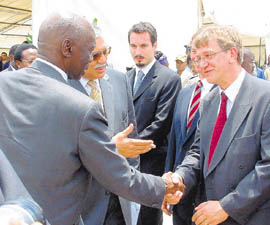http://allafrica.com/stories/200203140819.html
US $85m Plant to Boost National Power Supply
The Nation (Nairobi)
March 15, 2002
Njuguna Mutonya
 Mr Nizar Juma, the chairman of Tsavo Power Company (second left) introduces to President Moi the firm's Chief Executive
Officer Mr John Hides (right) during the official inauguration of the plant yesterday in Mombasa. Looking on (centre) is Prince
Rahim Aga Khan.
Mr Nizar Juma, the chairman of Tsavo Power Company (second left) introduces to President Moi the firm's Chief Executive
Officer Mr John Hides (right) during the official inauguration of the plant yesterday in Mombasa. Looking on (centre) is Prince
Rahim Aga Khan.
President Moi yesterday made a pitch to local businessmen to lead the way in investment, saying they had to show their
confidence in the economy first before foreigners did so.
The President, accompanied by Prince Rahim Aga Khan, was officially inaugurating the Sh6.8 billion Kipevu II power
generation plant in Mombasa.
He said donors and equity holders in the project had shown confidence in the government's policies.
"I do not believe that Kenya is a high risk investment area like some people try to make it," he said. "In fact, the policies of
Kenya are good policies."
President Moi praised the efficient implementation of the Tsavo Power Company project, which had been achieved on time
and had met the intended production targets even ahead of schedule.
The Tsavo Power plant, which adds 74 MW of electricity to the national power grid, is owned by a consortium of investors -
including Industrial Promotion Services (Kenya) Ltd, an affiliate of the Aga Khan Fund for Economic development, which
joined together with CINergy Corporation of the United States to form IPS-CINergy Power Ltd with 49.9 per cent
shareholding.
Others are CDC Group Plc with 30 per cent, Wartsila Development and Finance Services, 15.1 per cent, and the
International Finance Corporation with 5 per cent shareholding.
Mr Nizar Juma, the Tsavo Power Company chairman, said the plant had been built in line with the requirements of the new
national environmental guidelines.
"To ensure compliance with environmental regulations, a remotely operated air quality monitoring station has been located at
Mazeras," he said. Kenya, President Moi said, was ready for serious investors, who would enjoy the benefits of the
liberalisation programmes undertaken by the government.
He cited three Export Processing Zones in Changamwe which provide employment opportunities for 3,000 workers.
"This is what we need in Kenya," he added. "Even if it is a small businessman, if you can invest and employ three people, it will
help those unemployed in the streets."
The President appealed to key players in the oil sub-sector to be more responsive to consumer interests when fixing fuel
prices. By doing so, they would help reduce the cost of electricity generation, leading to lower electricity bills. The 30 per cent
crude oil importation quota allocated the National Oil Corporation of Kenya has also been abolished.
Despite reforms in the oil sub-sector since 1994, President Moi said, consumer expectations of reliable power delivery and
lower tariffs were yet to be realised. He attributed the delay to limited financial resources.
Energy Minister Chris Okemo said that the commissioning of the Tsavo plant had enhanced the national power reserve by 31
per cent.
He said the Kenya Power & Lighting Company had entered into an agreement with its Ugandan counterpart in January for the
supply of 50 megawatts, which could be upped to 80 MW by 2006 upon the completion of the Bujagali Hydro Power
project.
Negotiations, he said, were at an advanced stage for the purchase and exchange of power with Tanzania and for imports from
Zambia.
"The Interconnection with Zambia, through Tanzania, will help us access the South African Power Pool," he added.
KPLC Chairman Dennis Afande said the commissioning of the Tsavo plant last year had brought the installed capacity of
power in Kenya to 1,143 MW against a maximum demand of only 753 MW.
"At the moment there is a reserve capacity of 235 MW," He said.
 Mr Nizar Juma, the chairman of Tsavo Power Company (second left) introduces to President Moi the firm's Chief Executive
Officer Mr John Hides (right) during the official inauguration of the plant yesterday in Mombasa. Looking on (centre) is Prince
Rahim Aga Khan.
Mr Nizar Juma, the chairman of Tsavo Power Company (second left) introduces to President Moi the firm's Chief Executive
Officer Mr John Hides (right) during the official inauguration of the plant yesterday in Mombasa. Looking on (centre) is Prince
Rahim Aga Khan.